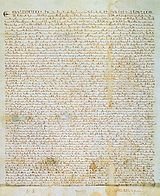
Magna Carta
The Magna Carta, Latin for "Great Charter", literally "Great Paper"), also known as 'Magna Carta Libertatum, is an English 1215 charter which limited the power of English Monarchs, specifically King John, from absolute rule. Magna Carta was the result of disagreements between the Pope and King John and his barons over the rights of the king: Magna Carta required the king to renounce certain rights and respect certain legal procedures, and to accept that the will of the king could be bound by law. Magna Carta is widely considered to be the first step in a long historical process leading to the rule of constitutional law.
- Neither we nor our officials will seize any land or rent in payment of a debt, so long as the debtor has movable goods sufficient to discharge the debt.
- Clause 9
- No man shall be forced to perform more service for a knight's 'fee', or other free holding of land, than is due from it.
- Clause 16
- For a trivial offence, a free man shall be fined only in proportion to the degree of his offence, and for a serious offence correspondingly, but not so heavily as to deprive him of his livelihood.
- Clause 20
- No constable or other royal official shall take corn or other movable goods from any man without immediate payment, unless the seller voluntarily offers postponement of this.
- Clause 28
- No sheriff, royal official, or other person shall take horses or carts for transport from any free man, without his consent.
- Clause 30
- In future no official shall place a man on trial upon his own unsupported statement, without producing credible witnesses to the truth of it.
- Clause 38
- No freeman shall be taken, or imprisoned, or outlawed, or exiled, or in any way harmed, nor will we go upon him nor will we send upon him, except by the legal judgement of his peers or by the law of the land.
- Clause 39
- To none will we sell, to none deny or delay, right or justice.
- Clause 40
- All merchants may enter or leave England unharmed and without fear, and may stay or travel within it, by land or water, for purposes of trade, free from all illegal exactions, in accordance with ancient and lawful customs. This, however, does not apply in time of war to merchants from a country that is at war with us. Any such merchants found in our country at the outbreak of war shall be detained without injury to their persons or property, until we or our chief justice have discovered how our own merchants are being treated in the country at war with us. If our own merchants are safe they shall be safe too.
- Clause 41
- To any man whom we have deprived or dispossessed of lands, castles, liberties, or rights, without the lawful judgement of his equals, we will at once restore these.
- Clause 52
- IT IS ACCORDINGLY OUR WISH AND COMMAND that the English Church shall be free, and that men in our kingdom shall have and keep all these liberties, rights, and concessions, well and peaceably in their fulness and entirety for them and their heirs, of us and our heirs, in all things and all places for ever.
- Clause 63
